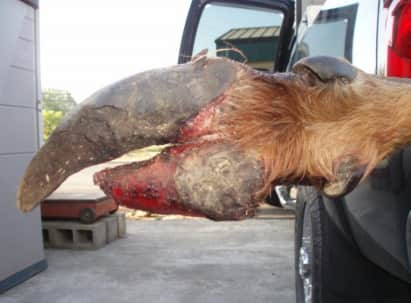Washington Wildlife Officials Plan to Act Against Widespread Hoof Disease
OutdoorHub Reporters 05.23.14

After taking samples from infected animals earlier this year, the Washington Department of Fish and Wildlife (DFW) has finally identified the culprit behind a mysterious illness affecting elk hooves in the southwestern parts of the state and is now laying the groundwork for action against the disease.
In a meeting between the department and outside experts, DFW regional program manager Sandra Jonker outlined an ambitious plan to stop the disease (caused by Treponema bacteria, the same genus of bacteria that causes syphilis and yaws) in its tracks. The plan will enlist a number of “citizen science volunteers” to gather information on the spread of the infection, require hunters to turn in hooves from infected animals, and possibly destroying a number of elk in a buffer control zone, which has yet to be identified.
“Hoof disease on this kind of scale in a wild population we’ve never seen before,’’ Jonker told The Columbian.
While the disease has been reported since the mid-1990s, sightings of infected elk have sky-rocketed since 2008. Biologists initially believed that the illness was caused by anything from malnutrition to toxicity to metabolic irregularities, but recent test results from four separate laboratories confirmed that Treponema was indeed the culprit. The disease causes elk hooves to become twisted and overgrown, and can even cripple an animal. Experts say that it has also proven to be very difficult to remove from a herd once the animals become infected, and hunters and conservationists are now putting pressure on the DFW to address the issue.
The DFW is treating it as a significant priority and will be allocating up to $388,000 in its 2014 budget to deal with the problem. The department will also be looking to hire additional staff dedicated to combating the disease.
“It is very important to acknowledge up front that any approaches that have successfully been used to manage disease in domestic animals will be entirely experimental when applied to free-ranging elk,’’ Jonker added.
Treponema bacteria can also lead to deformities in livestock and wild sheep. Officials have not yet confirmed whether the infection can affect humans.

